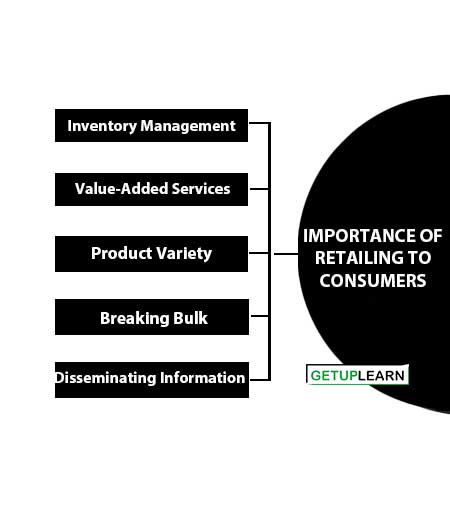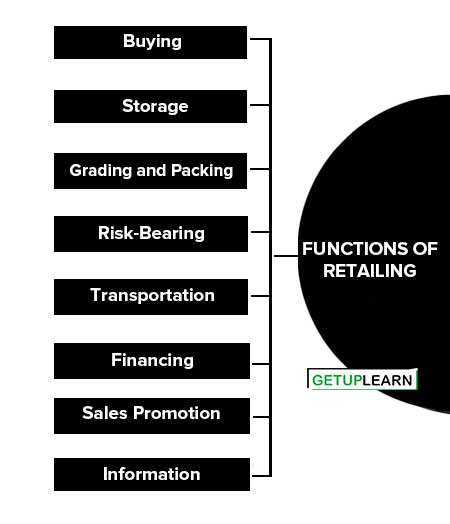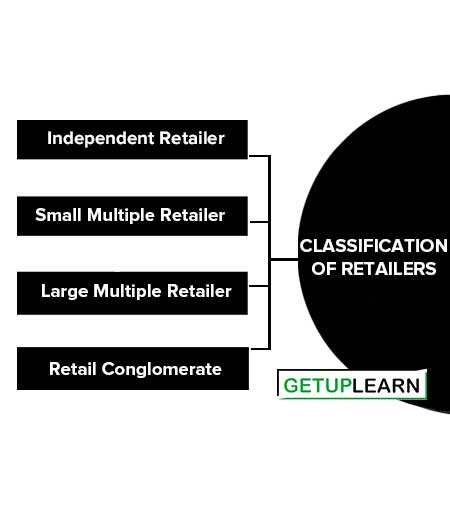Table of Contents
What is Retailing?
Retailing is the business where an organization directly sells its products and services to an end consumer and this is for his personal use. By definition whenever an organization be it a manufacturer or a whole seller sells directly to the end consumer it is actually operating in the Retail space.
Retailing is one of the most common forms of small entrepreneurship that deals with all the activities involved in selling goods and services directly to customers.
Effective retail marketing is vitally important for today’s manufacturers. Without a presence in retail stores, businesses rarely achieve the high level of exposure or widespread product distribution that retail stores offer. Retailers can help small businesses by performing a wide range of marketing services, from promoting products directly to customers to giving customers a chance to view and test products.
Importance of Retailing to Consumers
Retailers act as buying agents for consumers. They add value to the distribution process by ensuring that the consumer gets the right product, at the right time and at the right place. As a buying agent, the retailer performs many useful activities for the consumer. These are the importance of retailing to consumers:

Inventory Management
They bear the cost of storing products so that customers do not have to stock essential products and incur resulting costs. Retailers do the stocking in their stores and the consumer can shop at convenience.
Value-Added Services
Apart from providing consumers this convenience, retailers provide value-added services that benefit them.
Examples are free home delivery and facilitating transactions by allowing consumers to pay for products and services through credit cards and in installments. Retailers also provide loans to enable consumers to overcome temporary financial crunches.
Product Variety
Retailers have the advantage of selecting the best products from a range of manufacturers. This enables them to display a wide assortment to suit the needs and tastes of different customers. At the same time, it gives customers an extensive choice in product selection.
Breaking Bulk
Another important function of retailers is that they make purchases easier by selling products in small quantities.
Retailers purchase goods from manufacturers in bulk and convert them into smaller units to suit consumers. The retailers help by breaking bulk into smaller units. This also facilitates easier transportation of goods to the consumer.
Disseminating Information
Retailers disseminate information about different products in the market. Retail stores, through in-store displays and sales personnel, disseminate information about new products launched in the market.
Importance to Other Channel Members
Retailers not only make products available to consumers, who are geographically dispersed but also act as a source of information to manufacturers about consumer requirements. Manufacturers seek retailers’ help to gather information about consumer tastes and preferences.
They also obtain information on product quality and usage. Manufacturers use this information to modify existing products and launch new products. This information is valuable because retailers enjoy the advantage of having direct contact with consumers.
Further, retailers assist manufacturers to streamline and specialize production so that different products can be made available according to changing customer tastes. This helps manufacturers gain higher profits.
Source of Employment By Retail Sector
Retailing is a labor-intensive activity and employs a large number of people. It accounts for 15-20 percent of the total workforce in developed nations. Retailing is also a major employment sector for women. In the European Union, approximately 55% of employees in the retail sector are women.
The retail sector has significantly impacted employment in India as well. The organized retail business in India is worth about $3 billion and is expected to be a fast-growing business sentiment. With increasing economic growth and improved standard of living, consumption levels are set to reach never-before levels. This will be a boon for the retail sector.
Functions of Retailing
Discussed below are a few functions of retailing:
- Buying
- Storage
- Grading and Packing
- Risk-Bearing
- Transportation
- Financing
- Sales Promotion
- Information

Buying
A retailer buys a wide variety of goods from different wholesalers after estimating customer demand. He selects the best merchandise from each wholesaler and brings all the goods under one roof. In this way, he performs the twin functions of buying and assembling goods.
Storage
A retailer maintains a ready stock of goods and displays them in his shop. 3. Selling: The retailer sells goods in small quantities according to the demand and choice of consumers. He employs efficient methods of selling to increase his sales turnover.
Grading and Packing
The retailer grades the goods which are not graded by manufacturers and wholesalers. He packs goods in small lots for the convenience of consumers.
Risk-Bearing
A retailer always keeps stock of goods in anticipation of demand. He bears the risk of loss due to fire, theft, spoilage, price fluctuations, etc.
Transportation
Retailers often carry goods from wholesalers and manufacturers to their shops.
Financing
Some retailers grant credit to customers and provide the facility of return or exchange of goods. In some cases, home delivery and after-sale service are provided by retailers.
Sales Promotion
A retailer displays goods. He carries out publicity through shop decoration, window display, etc. He maintains direct and personal contact with consumers. He persuades consumers to buy goods through personal selling.
Information
Retailers provide knowledge to consumers about new products and uses of old products. They advise and guide consumers in a better choice of goods. They also provide market information to wholesalers and manufacturers.
Classification of Retailers
One way of making a distinction between different types of retailers is by looking at the organization in terms of ownership and control. Most retail organizations can be placed into one of four categories:

Independent Retailer
An independent retailer is one who builds his or her business from the ground up. It starts from the business planning stage to the opening day; all things are carried out by the independent retailer. This can be done by hiring consultants, staff, and others to assist in business deals. The opportunities are vast and never-ending.
The advantage of this is that no restrictions are created on who, how, or where an entrepreneur should set up their business. It gives one freedom to do what he wants to do for taking advantage of the business. It is extremely rewarding.
A disadvantage is that as it can be started easily and with flexibility, it can create a lot of competition in a specific area for a certain type of customer. Every business rests on the owner. Branding is not done and there are no preset guidelines.
Small Multiple Retailer
Most ‘high-street’ retailers fall into the category of multiple retailers, which is the term applied to retail organizations that have a central operational headquarters and a collection of branch stores under common ownership.
Most, although by no means all, multiple retailers are public limited companies and are therefore owned by a collection of shareholders to whom the directors of the companies are responsible.
Private multiple retailers are sometimes family-owned and run businesses and allow for a greater degree of personal operational control than in a publicly owned business. The size of the business will be related to the number of branch stores and the size of those stores. A small multiple retailer is one which runs between 10 and 50 stores, after which is termed a large retailer.
Large Multiple Retailer
One way in which independent retailers have been able to fight against the might of multiple retailers is by becoming a member of a voluntary retail group. Such groups operate in a variety of ways, but the main objective is to gain some of the buying power advantages of multiple retailers by collating orders from a number of independent retailers and negotiating with suppliers through a central buying organization.
Members pay a subscription that may also cover the provision of additional retail services such as marketing and training. Some voluntary groups have a strong brand identity brought about by the requirement of members to trade under a common fascia and to stock a range of own-label products.
Retail Conglomerate
As retailers become increasingly powerful corporations, there has been a growing amount of financial organizational activity in terms of mergers, takeovers, alliances, and joint ventures.
In many cases, companies have been amalgamated under one retail brand, but in others separate brands or fascias have been retained with the holding company trading as separate identities, giving rise to the retail conglomerate franchisee.
FAQs About the What is Retailing?
What are the functions of retailing?
The following are the functions of retailing: 1. Buying 2. Storage 3. Grading and Packing 4. Risk-Bearing 5. Transportation 6. Financing 7. Sales Promotion 8. Information.
What is the importance of retailing to consumers?
The following is the importance of retailing to consumers:
1. Inventory Management
2. Value-Added Services
3. Product Variety
4. Breaking Bulk
5. Disseminating Information.
